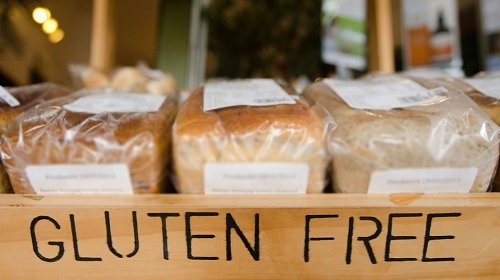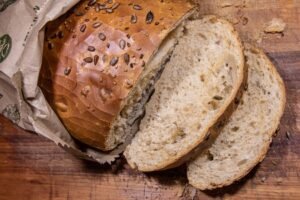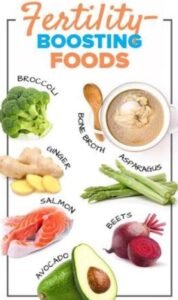It’s time to say it… Infertility Sucks! Today I want to share the challenges I have with managing my celiac and infertility- especially at Christmas time!
The holidays don’t make this any easier as pregnant women seem to be out in droves and you wish you were hanging ornaments on your tree that said ‘My First Christmas.’
No ornaments, no big belly – just a fertility diet that clashes with Christmas buffets like Crocs with an evening gown.
‘Celiac and Infertility’ Family Recruitment Plan
But instead of going any further down the ‘infertility sucks’ road than I already have, I want find a way to get through this holiday enjoying each and every gathering with family and friends. This, I believe, is only going to happen with their support.
 So, since my body is thriving on my new fertility diet, I feel like I need to let my family know what I’m doing and why. This way, I don’t have to stumble over my words as I decline half the dishes on the table or pretend like I’m excited about the mounds of chocolate in my stocking (my mouth is watering as I just write the word).
So, since my body is thriving on my new fertility diet, I feel like I need to let my family know what I’m doing and why. This way, I don’t have to stumble over my words as I decline half the dishes on the table or pretend like I’m excited about the mounds of chocolate in my stocking (my mouth is watering as I just write the word).
Essentially, I want to recruit them to my team – which is a heck of a lot easier than always wondering how I can politely decline that appetizer again and wondering if I can resist the chocolate when it comes with,
“Oh, come on, a little sugar is good for you.”
My solution: Let them know exactly where I stand. The result is an email that I wrote yesterday. It came pouring out of me. There is no asking or explaining with apologies. Instead, I wrote about what I’ve been going through, how I feel, and how they can help.
When I hit the send button, a weight had been lifted off my shoulders.
Letter to My Family:
Hi Fam,
I wanted to send you guys this email to let you know what has been going on. It’s a bit long – but bear with me.
Over the past year I have been really struggling with my health.
I know I have talked about it a lot to the point where I seemed obsessed. The truth is: I was really scared.
I lost over ten pounds (dropped a pants and bra size), was losing my hair (noted by me and my hair dresser), was bleeding during bowel movements, had constipation, was extremely fatigued, had acne that the dermatologists couldn’t cure, woke up nightly with muscle cramps, had abdominal pain that kept me in bed some days for the whole day, had hip pain so strong that I could not sleep on my side, had tailbone pain that made sitting for longer periods painful.
This is a lot – and it’s not even everything!
I’ve tried really hard to gain the weight back over the last three months consuming around 2500 calories a day (many days eating more than Richard). But each morning I could still see my all my ribs in the mirror and hadn’t gained an ounce.
I finally went to the doctor several weeks ago. He found nothing except for low iron and an underactive thyroid.
He tested me for celiac disease (a disease in which gluten damages the intestine so you can’t absorb nutrients from food – which came back negative), but since I was already on a virtually gluten free diet, it wasn’t valid.
The only way to do a valid test is to eat a considerable amount of gluten for at least several weeks (a.k.a. – damage you intestine) and run the test which may take from months to years to show a positive reading. I did not want to do this.
Instead I increased my diet to 100% gluten free – after reading that only a ¼ gram can cause damage to your intestine without creating symptoms. This was three weeks ago.
Over the past three weeks I’ve watched my skin clear up entirely, my energy has returned, I have no tailbone pain, no bleeding during bowel movements, regular bowel movements, and I have no muscle cramps. And best of all: I gained 2 pounds!!!
I can’t express how happy I am.
So why am I telling you all this? I wanted to let you guys know for several reasons.
- I can not eat gluten. Which means I am not eating out at all and when/if you cook for me I will either make my own or read all the ingredients you use. Gluten hides in everything (spices, sauces, etc).
- When I am complicated because I make different food or don’t eat something, know that it is not because I want to do it: I have to do it. You don’t need to do anything extra for me, I just ask that you respect the situation and understand that this is not all in my head.
- Celiac disease is hereditary. I do not have a diagnosis, but it could not be any more obvious (not to mention that both mom and grandma have discovered over the years that they have trouble with wheat/gluten). When I heard that our new arrivals in the family are having digestive problems I wanted to share this information with you. Undetected celiac disease can lead to a myriad of health problems because the body is not getting the nutrients it needs. And it would be important to diagnose because if you have it, you have to follow a 100% gluten free diet. A partially gluten free diet may reduce symptoms but does not prevent damage and, it complicates diagnosis.
And by the way, celiac disease has been linked to infertility. So, let’s hope that this solves my other problem.
Love,
Dina
Interesting Findings from A Celiac and Infertility Study
- When women with undiagnosed celiac disease, had 11 more miscarriages per 1,000 pregnancies and 1.62 more stillbirths per 1,000 pregnancies.
- In the two years leading up to a celiac disease diagnosis, women become pregnant less often, with 25 less pregnancies per 1,000.
- Pregnancy problems in women undiagnosed was 15 more per 1,000 pregnancies compared to women who did not have celiac disease.
- Women with infertility were 3.5 times more likely to have celiac than the ‘controls.’
Ref: 2018 Danish study published in the journal Human Reproduction.
If you enjoyed reading my blog, please write a comment here or bookmark it to a social bookmarking site by using the link below.
Thanks!



 Stacey Roberts from Sharkey’s Healing Center shared a case in her August 2008 newsletter that she had of a couple who had been trying to conceive for three years and received the diagnosis of unexplained infertility.
Stacey Roberts from Sharkey’s Healing Center shared a case in her August 2008 newsletter that she had of a couple who had been trying to conceive for three years and received the diagnosis of unexplained infertility. I’ve been suffering from digestive issues for a while now. They include bloating, constipation, and blood in the stool. Unfortunately, I started a gluten-free diet before I being tested.
I’ve been suffering from digestive issues for a while now. They include bloating, constipation, and blood in the stool. Unfortunately, I started a gluten-free diet before I being tested.
 Sifting through books and articles on fertility and health I’ve come across various studies on the effects of animal and vegetable protein on fertility. There is, however, no consensus on which source is best for improving your changes of conception. What doctors and researchers do agree on, though, is that insulin regulation is vital to fertility.
Sifting through books and articles on fertility and health I’ve come across various studies on the effects of animal and vegetable protein on fertility. There is, however, no consensus on which source is best for improving your changes of conception. What doctors and researchers do agree on, though, is that insulin regulation is vital to fertility.
 A Danish study
A Danish study Foods that Contain Prebiotics
Foods that Contain Prebiotics
 Largely attributed to this increase in chromosomal abnormalities is also the occurrence of more
Largely attributed to this increase in chromosomal abnormalities is also the occurrence of more